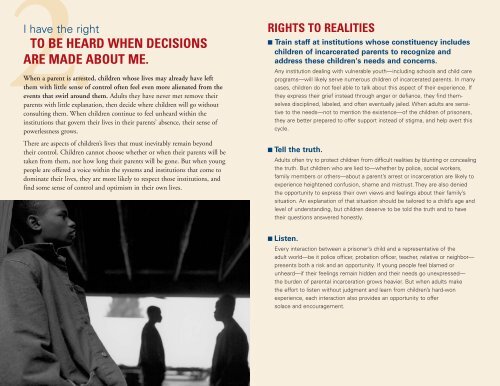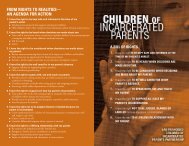Children-of-Incarcerated-Parents-Bill-of-Rights
Children-of-Incarcerated-Parents-Bill-of-Rights
Children-of-Incarcerated-Parents-Bill-of-Rights
You also want an ePaper? Increase the reach of your titles
YUMPU automatically turns print PDFs into web optimized ePapers that Google loves.
2.I have the rightTO BE HEARD WHEN DECISIONSARE MADE ABOUT ME.When a parent is arrested, children whose lives may already have leftthem with little sense <strong>of</strong> control <strong>of</strong>ten feel even more alienated from theevents that swirl around them. Adults they have never met remove theirparents with little explanation, then decide where children will go withoutconsulting them. When children continue to feel unheard within theinstitutions that govern their lives in their parents’ absence, their sense <strong>of</strong>powerlessness grows.There are aspects <strong>of</strong> children’s lives that must inevitably remain beyondtheir control. <strong>Children</strong> cannot choose whether or when their parents will betaken from them, nor how long their parents will be gone. But when youngpeople are <strong>of</strong>fered a voice within the systems and institutions that come todominate their lives, they are more likely to respect those institutions, andfind some sense <strong>of</strong> control and optimism in their own lives.RIGHTS TO REALITIES■ Train staff at institutions whose constituency includeschildren <strong>of</strong> incarcerated parents to recognize andaddress these children's needs and concerns.Any institution dealing with vulnerable youth—including schools and child careprograms—will likely serve numerous children <strong>of</strong> incarcerated parents. In manycases, children do not feel able to talk about this aspect <strong>of</strong> their experience. Ifthey express their grief instead through anger or defiance, they find themselvesdisciplined, labeled, and <strong>of</strong>ten eventually jailed. When adults are sensitiveto the needs—not to mention the existence—<strong>of</strong> the children <strong>of</strong> prisoners,they are better prepared to <strong>of</strong>fer support instead <strong>of</strong> stigma, and help avert thiscycle.■ Tell the truth.Adults <strong>of</strong>ten try to protect children from difficult realities by blunting or concealingthe truth. But children who are lied to—whether by police, social workers,family members or others—about a parent’s arrest or incarceration are likely toexperience heightened confusion, shame and mistrust. They are also deniedthe opportunity to express their own views and feelings about their family’ssituation. An explanation <strong>of</strong> that situation should be tailored to a child’s age andlevel <strong>of</strong> understanding, but children deserve to be told the truth and to havetheir questions answered honestly.■ Listen.Every interaction between a prisoner’s child and a representative <strong>of</strong> theadult world—be it police <strong>of</strong>ficer, probation <strong>of</strong>ficer, teacher, relative or neighbor—presents both a risk and an opportunity. If young people feel blamed orunheard—if their feelings remain hidden and their needs go unexpressed—the burden <strong>of</strong> parental incarceration grows heavier. But when adults makethe effort to listen without judgment and learn from children’s hard-wonexperience, each interaction also provides an opportunity to <strong>of</strong>fersolace and encouragement.



